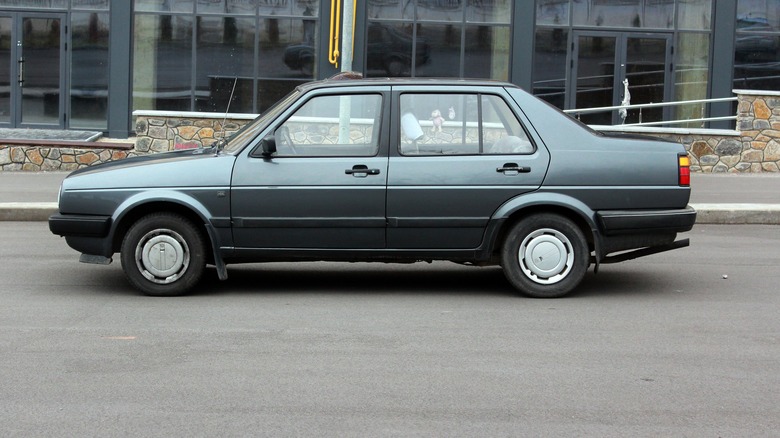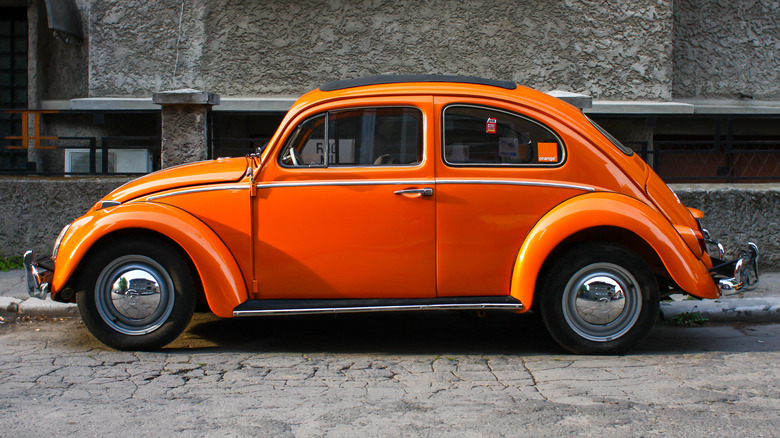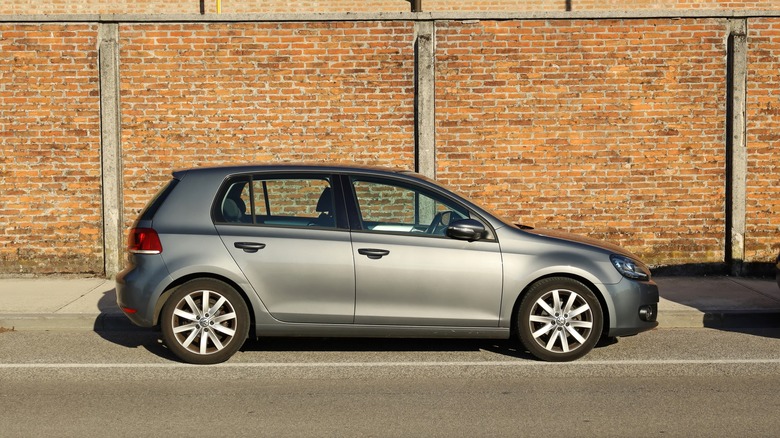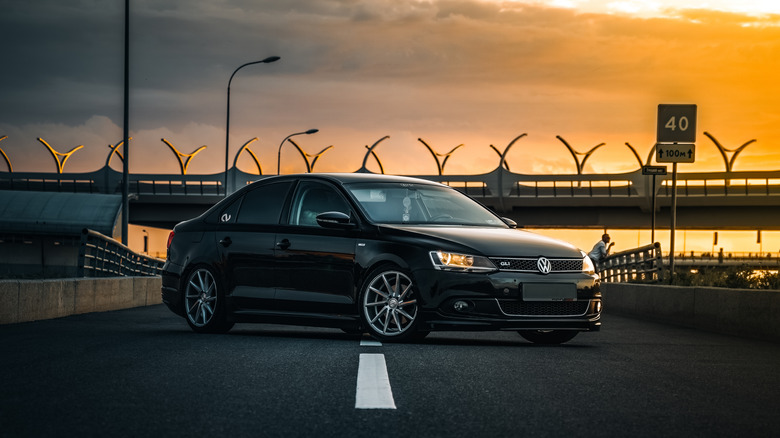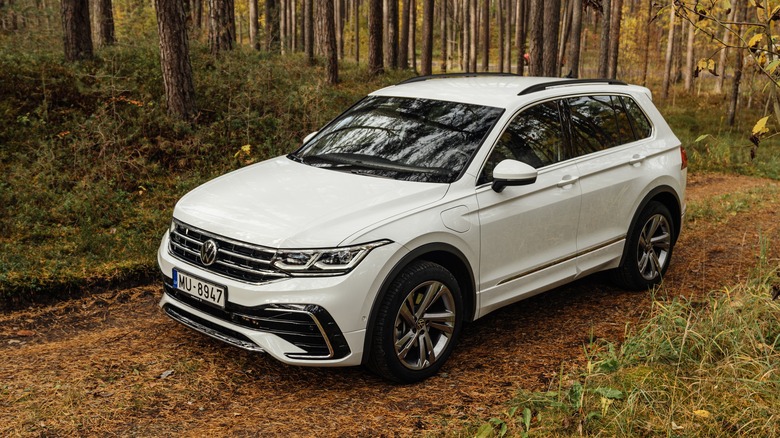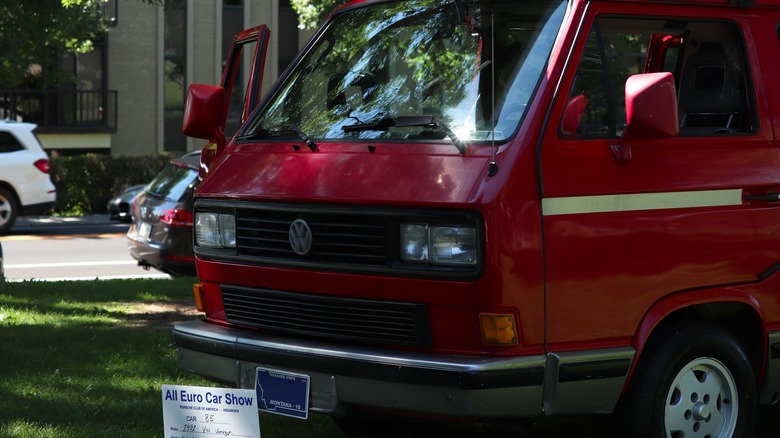5 Of The Most Reliable Volkswagen Models Ever Made
Volkswagen sold more cars than any manufacturer other than Toyota last year, building on its long history of producing economical, reliable, and accessible vehicles. Founded by Adolf Hitler's German government in 1937 as Volkswagenwerk, or "The People's Car Company," the Allies halted all German industrial production after World War II ended. Volkswagen of America was founded in 1955, but its ties to Nazi Germany kept the brand from becoming a sales darling in the United States. A landmark advertising campaign for the Beetle, launched in 1959 urging buyers to "think small," helped boost VW's U.S. sales steadily throughout the '60s, and VW enjoyed its best year ever in 1970 with almost 575,000 units sold.
Once the energy crisis hit in the early '70s, its lineup of fuel-efficient and reliable small cars helped keep the brand profitable, and sales remained strong into the 21st century. In 2015, Volkswagen briefly overtook Toyota for the No. 1 spot in worldwide sales until the Dieselgate scandal damaged Volkswagen's public image and cost the company more than $30 billion in fines and settlements.
But despite that major speed bump, Volkswagen still has an 85-year history of producing dependable vehicles. In JD Power's 2021 survey of customer loyalty, Volkswagen ranked 15th among all automakers worldwide, with 41.6% of VW owners opting for another Volkswagen again when choosing a new vehicle. Let's take a look at some of the models that have kept Volkswagen owners returning to the brand.
Beetle
Volkswagen's first-ever model, and the one it's still most identified with, is the Beetle. Originally commissioned by Hitler and designed by Ferdinand Porsche in the 1930s, the Beetle took off in the 1960s in the U.S. with the "think small" campaign. It gained further popularity when it was featured in Disney's film "Herbie the Love Bug" in 1968. The original Beetle was quirky and underpowered, chugging along with an air-cooled rear-mounted engine that, in 1961, churned out just 40 horsepower. The lack of oomph and the Beetle's simplicity may have contributed to the model's reliability.
The original Beetle disappeared from U.S. markets in the late '70s, and the model was revived in 1998 as the New Beetle, complete with a modern fuel-injected 115-horsepower 2.0-liter water-cooled four-cylinder engine. The following year, Volkswagen gave the Beetle a further boost in the form of a 150-horsepower turbocharged 1.8-liter four-cylinder motor. A 2001 Limited Edition brought all-wheel drive and a 221-horsepower V6, and further tweaks came in 2002, 2003, 2006, and 2012.
The original Beetle is remarkably simple to repair, with easy access to the engine bay and one YouTube video of an engine removal taking less than 10 minutes. One owner went through seven engines in driving his 1963 Beetle an incredible 1.61 million miles, which is almost 65 trips around the equator. The new Beetle is also easy on its owners. According to Repairpal, the average annual repair cost for the new Beetle is $612, slightly less than the average for all vehicles. The newest Beetle seems to be the most reliable, with the 2019 model year earning a 4.6 out of five-star rating and an 89% recommendation rate from owners at cars.com.
Golf
The Golf hatchback is one of Volkswagen's stalwarts and has a reputation for longevity and dependable operation. It was first introduced in 1974 and is now in its eighth generation, boasting more than 35 million units sold over that time — approximately one car every 41 seconds.
Those numbers make it Volkswagen's best-selling model ever, and customers would not keep buying the Golf if it did not reward them with reliability. Withclutch.com gives the Golf a 62.05 reliability score, which it classifies as "very reliable" compared to the industry average of 57. JD Power gave the 2021 Golf a 76 out of 100 for reliability, placing it sixth in the compact car category.
Thirty-five 2012 model year owners weighed in at cars.com and ranked the Golf 4.9 stars out of five, with every single one of them recommending the car. MChav called it a "great worry-free car. It just starts and goes without any hassle." Mike from Minneapolis wrote, "My third VW Golf — this one has been the best — love it for its versatility, low cost of ownership, reliability (only things I've had to replace is tires and battery in 112,000 miles)."
Jetta
The Jetta was introduced in 1980 as an extended version of the Golf and is currently in its seventh generation. The latest update came for the 2019 model year, and the 2023 Jetta features a 1.5-liter turbocharged four-cylinder engine coupled to a six-speed manual transmission or an optional eight-speed automatic. The Jetta's average annual repair cost is $609, slightly less than that of an average car, but a Jetta is less likely to need a major repair than the average vehicle. U.S. News and World Report ranked it fifth overall among all compact cars.
Older Jettas also have established a reputation for reliable operation. Matt Harion, a deputy editor at Men's Health magazine, drove his 2001 Jetta a half million miles before turning it over to Volkswagen to be dismantled for research purposes. His car should not be regarded as a tremendous outlier, however, as cars.com currently lists more than a dozen used Jettas for sale that have surpassed the 200,000-mile mark.
Tiguan
Volkswagen's reliable offerings are not limited to its older models like the Beetle, the Jetta, and the Golf. The Tiguan compact crossover SUV was introduced at the 2007 Frankfurt motor show and became an instant hit in Europe, selling more than 90,000 units in its first full year on the market and seeing steady increases in sales each year to a peak of almost 265,000 in 2019. The Tiguan took a little longer to catch on stateside, selling less than 10,000 units in its first year on the market but seeing steady increases from there through 2020, when it peaked at more than 110,000 sold.
JD Power gave the 2009 Tiguan an 80/100 reliability rating, and that score has remained relatively steady throughout the model's life, with the lowest being a 74 in 2018 and the highest an 83 in 2014; the 2023 model scored a 78. Fifty-seven 2014 Tiguan owners submitted reviews at cars.com and ranked their SUV 4.5 stars out of five, including a 4.6 for reliability, and 93% of them recommended the Tiguan to other buyers.
TMI from Greenville, SC, purchased their Tiguan used and drove it for seven years before leaving their review. They scored it a perfect five out of five for reliability and wrote, "Handles great and has been super reliable. I certainly would buy another one." Borislav from Ashburn called it a "Great small family SUV. [The] engine is very reliable and low maintenance."
Vanagon
Other than the Beetle, Volkswagen's most recognizable line of vehicles is probably its iconic vans. The Vanagon (a portmanteau of "van" and "station wagon") evolved from the bread-loaf buses of the late 1960s to the sleeker, more highway-worthy Eurovans, Westfalias, and Winnebago camper conversions of the mid-1990s.
The Vanagon was never a huge sales juggernaut, peaking at around 70,000 units sold per year in the early '70s before falling off sharply during the subsequent energy crisis. By the late '80s and early '90s, Volkswagen was selling just a few thousand Vanagons a year as the domestic minivan began its takeover of American roadways. There are still plenty of vintage Vanagons on the road, however, which is a testament to their durability. Another indicator of the Vanagon's dependability is its appearance on Hagerty's 2021 Bull Market List of vehicles expected to rise in value, a list that includes an Aston Martin, a Ferrari, and a Jaguar.
The most common issue with the water-cooled "Wasserboxer" Vanagons was a leaking head gasket, but a redesign of the cooling system in 1986 eliminated the issue for many Vanagon owners. The 1990 model Vanagon drivers ranked their vehicles 4.7 stars out of five at Edmunds.com. One owner named Andy wrote, "When I bought my Vanagon, I never thought that nearly 20 years later I would be writing a review about it. But with nearly 200,000 miles on the original drive train, it has become a part of my family's history. It is simple enough to do most of my own repairs, extremely durable and reliable. It truly is a vehicle that you can own your entire life."
